The UK was supposed to be the crypto-Singapore of Europe, but it did a sudden about-face.
As early as December 2022, soon after the FTX collapse, UK Economic Secretary Andrew Griffith reiterated the country's ambition to be a global crypto hub.
“We’re driving forward this agenda, and I continue to chair the crypto-engagement group to hear from industry and share progress. Yes, there are questions about the future of crypto, but we’d be foolish to ignore the potential of the underlying technology.” - CoinDesk
Then, in June 2023, the UK passed legislation to legitimize crypto in the country, giving regulators broad power to bring crypto and stablecoins into the scope of regulation. The bill, first introduced in July 2022, treats crypto as a regulated activity and supervises crypto promotions.
It all went downhill from there.
A bill passed in October 2023 gave law enforcement agencies the power to freeze crypto with criminal links without a conviction. More recently, the Financial Conduct Authority (FCA) of the UK added over 220 crypto-asset companies to its so-called “warning list,” featuring companies that haven't received the FCA's blessings to market their business in the country.
The list has an all-star cast with household crypto names like Binance and HTX making an appearance.
With these legislative changes, prospective Bitcoin investors might find themselves wondering if it's possible to dive into the world of cryptocurrencies, specifically Bitcoin, in the UK? The answer is a resounding yes, albeit with a few navigational challenges.
If you're looking to buy Bitcoin in the UK, fear not – there's still a route to set sail.
Disclaimer: Each exchange featured in this article is registered with the Financial Conduct Authority (FCA) of the UK. Non-FCA-registered exchanges cannot accept UK users. A full list of these registered companies can be found on the FCA's website.

Best Exchanges to Buy Bitcoin in the UK
With the FCA having blacklisted over 220 crypto asset firms, it's slim pickings for UK residents, but here are some of our picks for the best places to buy Bitcoin in the UK.
eToro
Israel-based eToro is an investment firm that added cryptocurrencies to the mix in 2014. Today, the website boasts over 30 million users.
 eToro Introduced Crypto Investment in 2014. Image via eToro
eToro Introduced Crypto Investment in 2014. Image via eToroHere's a snapshot of what's on offer at eToro:
- Buy Bitcoin and other cryptocurrencies without deposit fees via a wide variety of payment options.
- The platform supports all major cryptocurrencies, stocks and commodities.
- You can follow each coin's trends with advanced charts and analysis tools.
- Traders on eToro receive free access to the latest crypto market research and news.
- eToro provides a risk-free $100,000 in a virtual portfolio so you can get a better understanding and practice trading strategies.
- Copy trading, which lets you replicate the investment moves of other traders automatically.
While the eToro does offer crypto staking, it is currently unavailable for users based in the UK and US. For more information, you can head over to our in-depth eToro review where we also provide a Buying Bitcoin on eToro Guide.
👉 Sign up for eToro and easily buy Bitcoin & Trade Stocks!
Disclaimer: Don't invest unless you're prepared to lose all the money you invest. This is a high-risk investment and you should not expect to be protected if something goes wrong. Take 2 mins to learn more.
Yield App
Yield App can be described as a digital asset wealth management platform. In simpler terms, it's a place where you can put your cryptocurrency to work and earn yield. They offer features such as a launchpad, which allows retail investors to get involved in early-stage startups (a benefit previously reserved for VCs), and crypto savings accounts that pay interest, allowing users to earn passive income on Bitcoin and other supported cryptocurrencies.
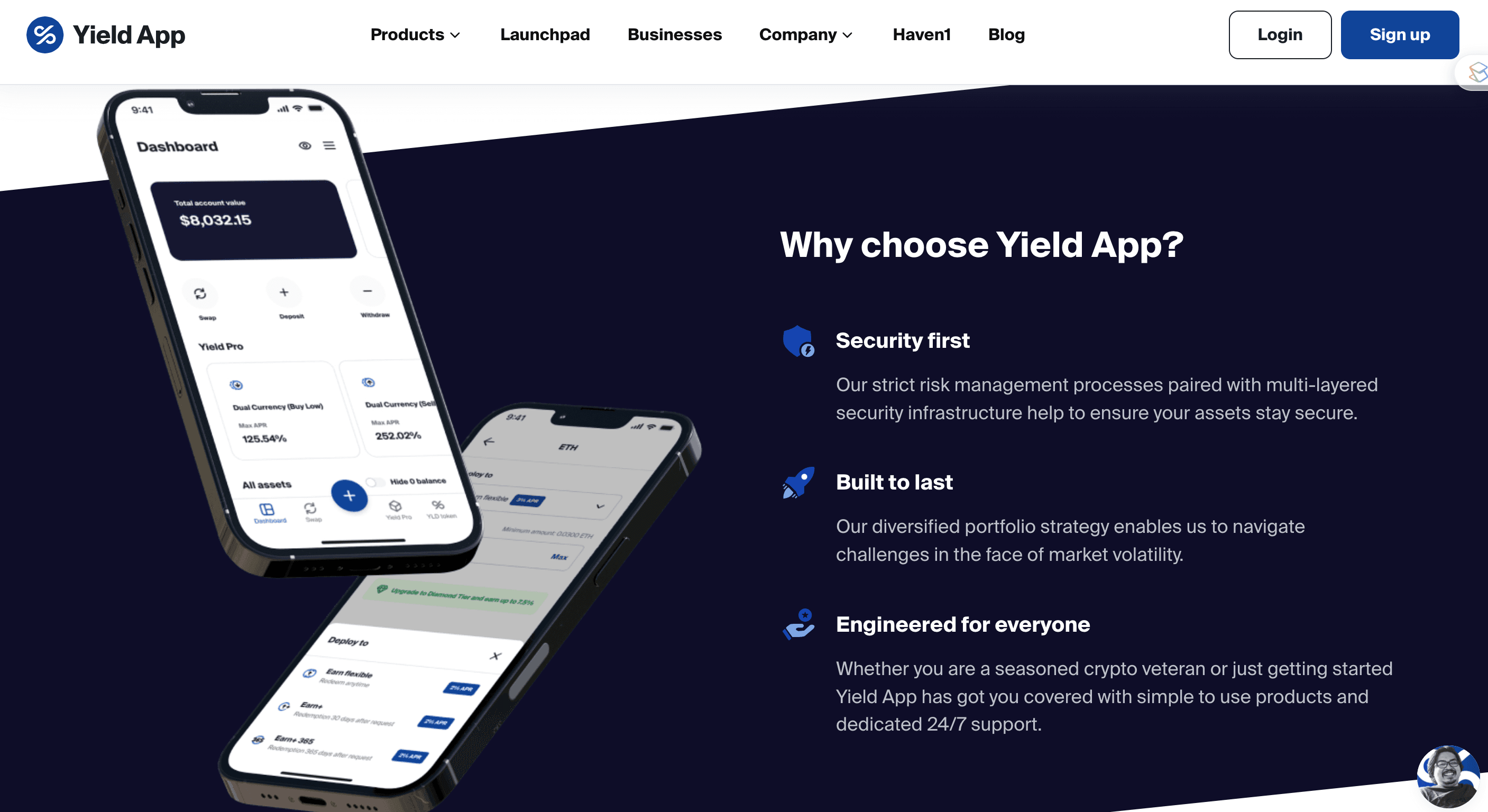 Image via Yield App
Image via Yield AppYield App has become a popular platform for those looking to earn yield but among its most powerful offerings is full crypto to fiat on and offramp services, facilitating seamless transfers to and from your bank account. Users in the UK are assigned their own sort code and banking details, making it possible for fiat-to-fiat, crypto-to-fiat and fiat-to-crypto transfers to run so efficiently. Additionally, the Yield App OTC desk offers among the lowest spreads in the UK for over-the-counter trades.
The company holds a VASP registration, Fireblocks insures custodial assets, and the platform has been operational since 2020, all of which point to Yield App being a solid and reputable platform for buying Bitcoin and other digital assets in both the UK and European markets.
We were quite impressed with what we uncovered when we wrote our Yield App Review.
Uphold
Uphold lets you buy and sell over 260 cryptocurrencies, including blue chips like Bitcoin and Ethereum and meme coins such as Dogecoin and Shiba Inu.
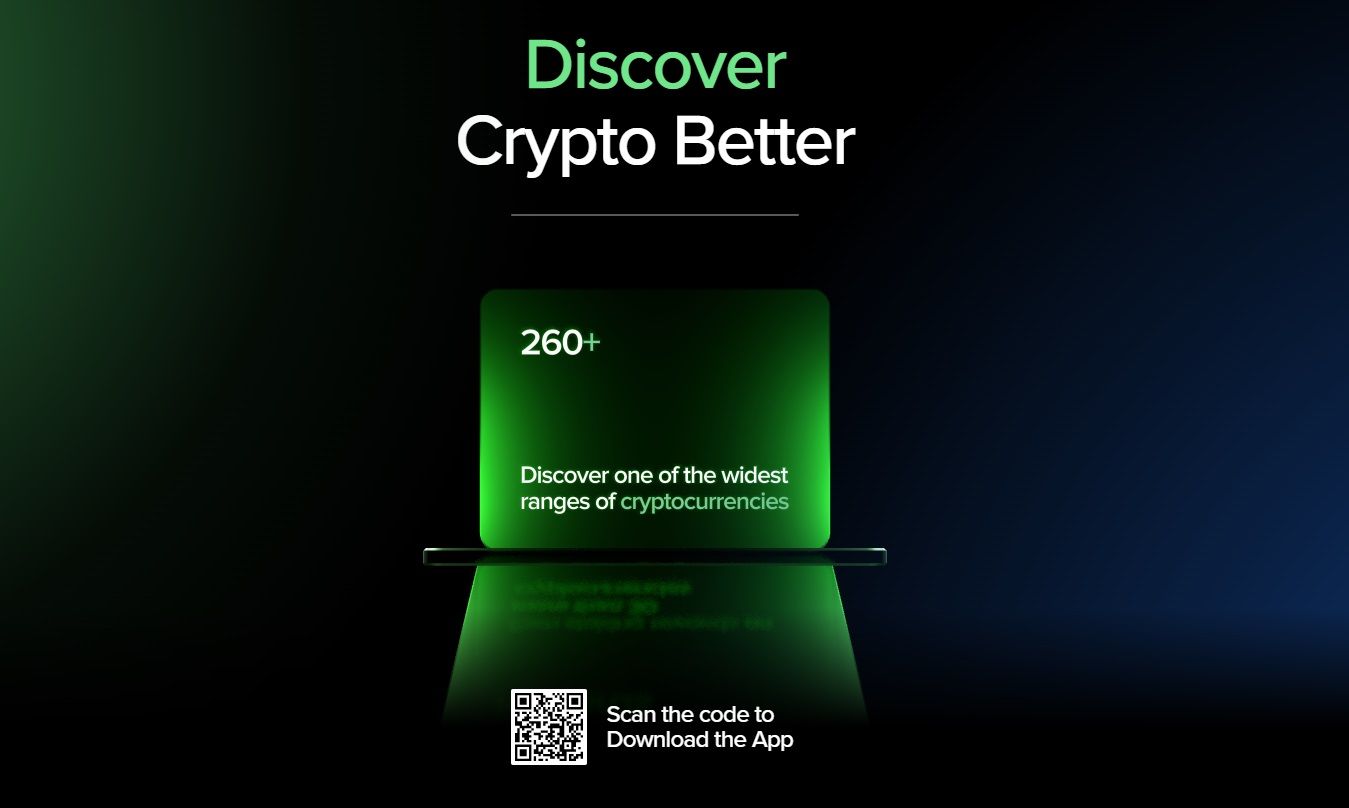 Uphold Lets You Buy and Sell over 260 Cryptocurrencies. Image via Uphold
Uphold Lets You Buy and Sell over 260 Cryptocurrencies. Image via UpholdThe Mastercard-branded, crypto-enabled Uphold Card comes with 0% foreign transaction fees and low exchange rates. There's no set-up or annual fees either. However, there is a £2.50 fee for national ATM withdrawals and £3.50 for foreign ones. The Uphold Card can be added to your Google Pay or Apple Pay wallets as well.
Uphold also offers staking services, offering APY of as much as 16%. Coins you can stake include ETH, Polkadot (DOT), Injective (INJ), Solana (SOL) and Cardano (ADA), among others.
Uphold is a great choice for UK-based users who are looking to buy, sell, and trade cryptocurrencies. Our full Uphold review explores the exchange's features as well as the pros and cons.
Disclaimer: Don't invest unless you're prepared to lose all the money you invest. This is a high-risk investment and you should not expect to be protected if something goes wrong.
Bitstamp
This centralized exchange lets you trade 86 cryptocurrencies. The platform boasts an intuitive interface, there are instant deposit options and you can cash out directly to your bank account.
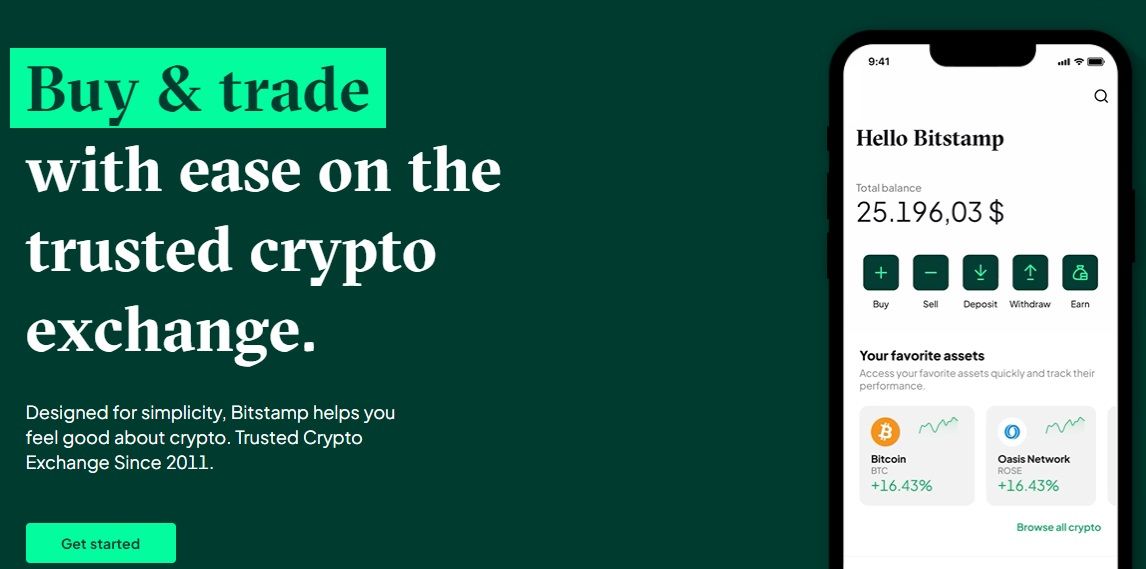 With Bitstamp, You Can Trade 86 Cryptocurrencies. Image via Bitstamp
With Bitstamp, You Can Trade 86 Cryptocurrencies. Image via BitstampYou can stake ETH and generate some yield, but the company takes a 15% commission on all rewards. Bitstamp employs institutional-grade security, with 95% of assets stored offline. It also has live customer support, a rarity in a world of AI chatbots.
Out in-depth Bitstamp review explores its features, security procedures, fees and customer support.
Fidelity
Fidelity is a large financial services firm based in the U.S. Fidelity Crypto is offered by Fidelity Digital Assets, which is approved by the FCA.
 Fidelity Crypto is a Bare-Bones Offering by Fidelity Investments. Image via Fidelity
Fidelity Crypto is a Bare-Bones Offering by Fidelity Investments. Image via FidelityBecause Fidelity is a traditional financial services firm, its crypto offering lacks the oomph typical crypto investors seek. For example, you can only buy and sell BTC and ETH commission-free. In June, Fidelity refiled paperwork for a spot Bitcoin ETF.
For users who don't mind the lack of crypto selection, Fidelity is certainly one of the most trusted and reputable firms in the financial industry, making this a great choice for users who prioritise safety, security, rules and regulations above all else.
Solidi
Solidi builds itself as the UK's "easiest and safest exchange" but the user interface leaves a bit to be desired.
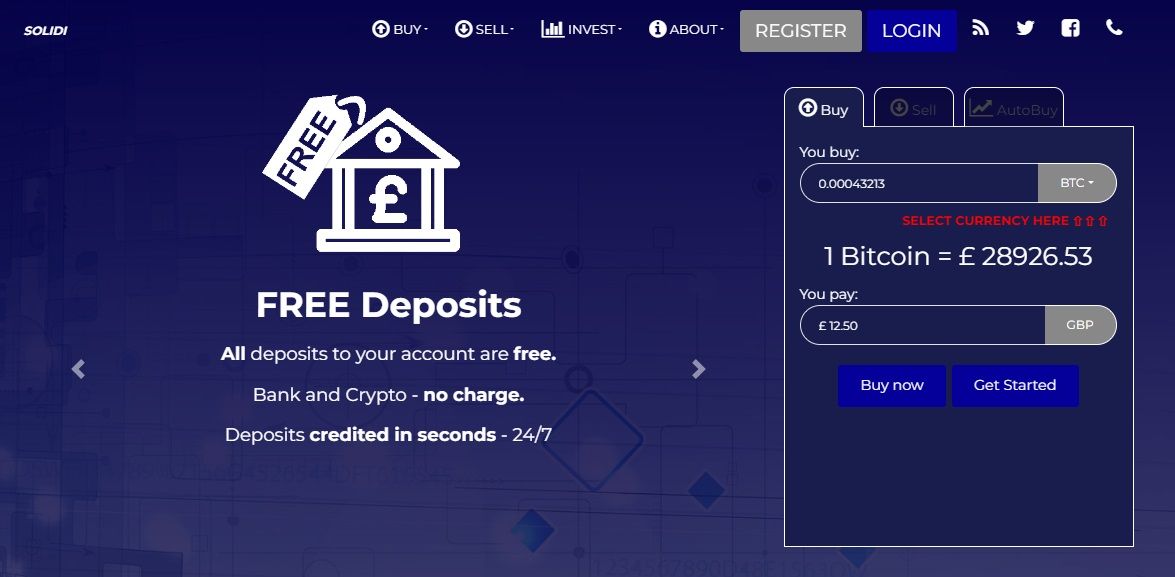 Solidi's User Interface Leaves More to be Desired. Image via Solidi
Solidi's User Interface Leaves More to be Desired. Image via SolidiSolidi only lets you trade four tokens — BTC, ETH, Ripple (XRP) and Litecoin (LTC). On the plus side, you can start with as little as £2. Turning to fees, the exchange charges a £0.50 withdrawal fee if you withdraw GBP. For more information, you can head over to the Solidi Fees page.
How to Buy Bitcoin in the UK
Now that you've locked on an FCA-registered exchange, here's how you can purchase Bitcoin.
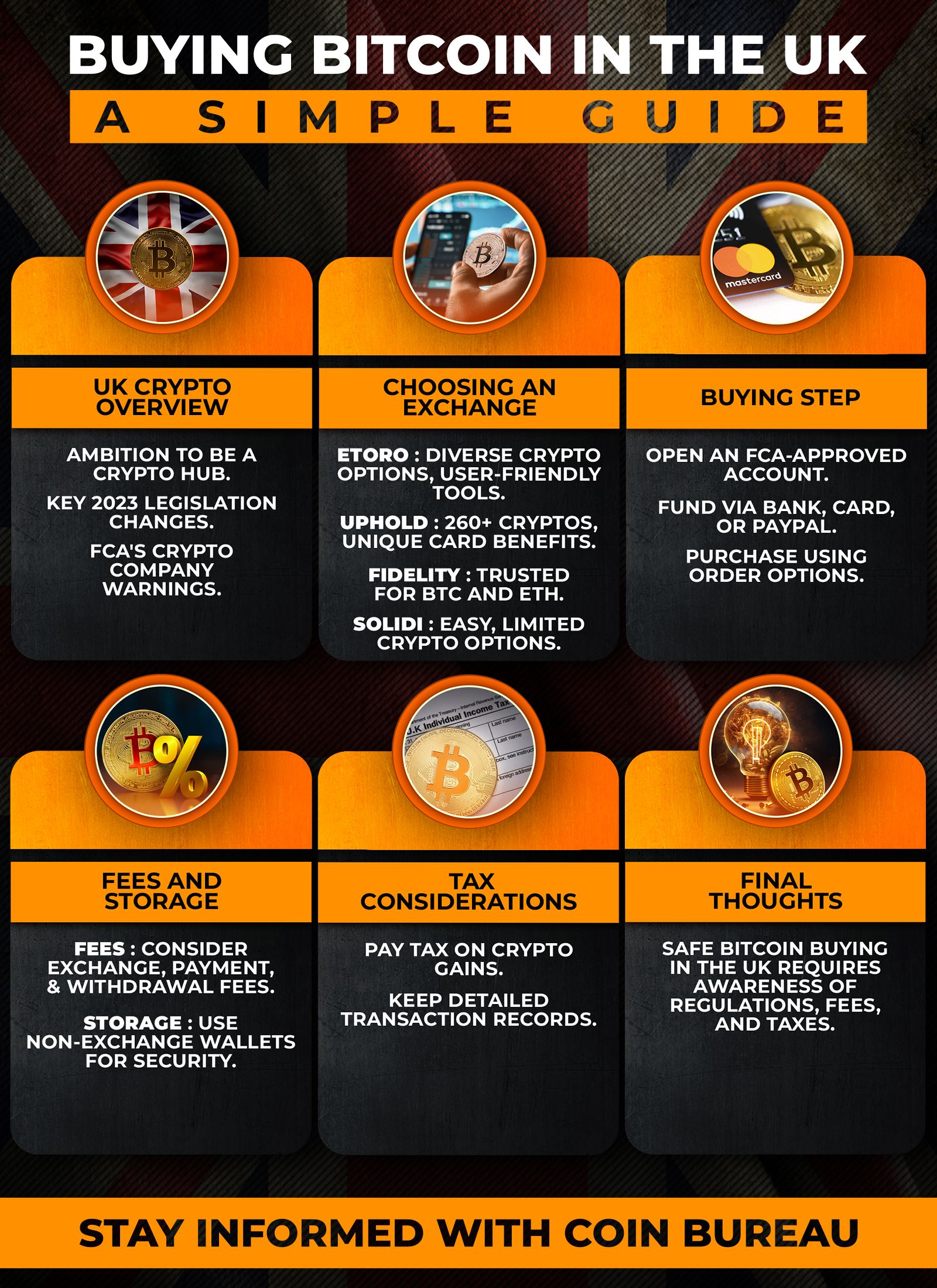
Step 1: Open An Account
The British government has been clamping down on crypto companies lately, leaving UK residents with just a handful of options. Still, we've highlighted some solid options above, and more importantly, they play friendly with the FCA.
Once you've decided on an exchange, the first order of business is to open an account. Most exchanges these days give you two options — open an account through your email address or your mobile phone number, whichever is more convenient. Then, input the necessary details accordingly.
It's important to note that most exchanges will ask that you verify your identity by uploading pictures of your driver's license, passport or another form of government-issued ID. Know your customer (KYC) standards are designed to ensure that an exchange remains in compliance with regulatory requirements meant to fight money laundering and other illicit financial activities.
Step 2: Fund Your Account
Most exchanges allow you to connect your bank account directly or you can link it to a debit or credit card. Other exchanges even let you use PayPal or other payment services like NETELLER to add money to your account.
Pro Tip: Most exchanges will allow you to buy crypto using a credit or debit card. Though quick and convenient, be sure to keep an eye on the fees as that convenience often comes with a price. From our experience, funding your crypto account via bank transfer is typically the cheapest (and often free) method of funding your account. The catch is it can take 3-5 business days for the funds to land in some cases.
Also, check with your bank before buying crypto with a credit card as we've seen cases of this being processed as a cash advance, meaning high interest rates and no interest-free grace period.
Step 3: Buy Bitcoin
Once you've added funds to your account, the last step is to get your hands on some digital gold.
Most crypto exchanges mimic the same features as traditional stock brokerages. Virtually all crypto exchanges offer both market and limit orders, and some also provide stop-loss orders.
- Market order: Orders executed immediately at the current market price are referred to as market orders. While the order is executed immediately, prices can vary slightly from the current market quote as a result of market volatility.
- Limit order: This order specifies a price at which you are willing to buy or sell. For example, if Bitcoin’s price is currently £29,000, but you’d like to purchase it for £25,000, you can choose limit order and enter the price to initiate this trade. The order will then be triggered automatically once the price hits your desired price point.
- Stop loss order: Designed to limit potential losses on a trade, this order type will automatically trigger a market order to close a trade when its price falls to or below a specified stop price.
What Are The Fees to Buy Bitcoin?
Several factors influence the fees you have to pay to purchase BTC. This includes the platform of your choice, the payment method and the amount of Bitcoin you're looking to buy. You should keep the following things in mind before buying BTC:
Exchange Fees: Most platforms charge a fee for buying, selling and trading BTC. These fees are charged by the exchange and can either be a percentage of the total transaction amount, or a fixed amount.
Payment Method: How you choose to pay affects the fees as well. Using a credit card or PayPal might incur higher fees compared to bank transfers or cryptocurrency deposits.
Withdrawal Fees: Looking to transfer Bitcoin to a personal wallet? Additional withdrawal fees may kick in along with network fees that will vary depending on network congestion. Check out our article on Crypto Network Fees to learn more about how those work.
Best Places to Store Bitcoin
Once you've bought Bitcoin, it's added to an on-exchange wallet. While convenient, it opens you up to a number of risks:
- Lack of Control: An exchange wallet is a custodial wallet, meaning you don't have control over your private keys. Put another way, you don't have control over your funds. If the exchange goes under or restricts your access, you might not be able to move your Bitcoin. We saw this happen with the collapse of the crypto exchange FTX, resulting in millions of users losing access to their funds.
- Security Breaches: Exchange wallets are central points of attack for hackers. Several high-profile crypto exchange hacks have occurred in the past — the now-defunct FTX was hacked to the tune of $600 million on the day it declared bankruptcy and Binance lost $570 million to hackers in October 2022. If the exchange's security is compromised, your funds could be stolen.
- Exchange Insolvency: If the exchange becomes insolvent or faces financial difficulties, your funds could be at risk. In such cases, recovering your assets may become a Herculean task.
Against this background, the best place to store Bitcoin is an off-exchange wallet. Between hardware wallets, desktop wallets and mobile wallets, there are plenty of options to go around. However, hardware wallets like those offered by Ledger (Nano X and S Plus) and Trezor provide a good level of security.
You can learn more about wallets by reading about the types of crypto wallets available or how hardware wallets work before deciding on whether you need one.
We also go into far greater detail on the security strengths and weaknesses of crypto storage devices in our Crypto Safety Guide.

Crypto Tax in the UK
Whether you're dealing in pounds or Bitcoin, there's no escape from the taxman's clutches!
In the UK, you might need to pay capital gains tax when you:
- Sell your tokens
- Exchange your tokens for a different type of crypto asset
- Use your tokens to pay for goods or services
- Give away your tokens to another person (unless it's a gift to your spouse or civil partner)
It's important to note that you'll only be on the hook for the gain you make, not the whole amount. For example, if you bought £15,000 worth of Bitcoin and made a profit of £800, the tax will be calculated on the gain you've made not the principal amount.
To make tax filing easy, it would be advisable to keep separate records for each transaction, including:
- Type of tokens
- The date you disposed of them
- Number of tokens you’ve disposed of
- Number of tokens you have left
- Value of the tokens in pound sterling
- Bank statements and wallet addresses
- A record of the pooled costs before and after you disposed of them
Capital gains tax in the UK ranges between 10% and 20% for individuals, depending on their income.
I recommend checking out our article on crypto tax tools to help make tax time a breeze.
How to Buy Bitcoin in the UK: Closing Thoughts
The UK's crypto journey has been nothing short of a rollercoaster ride. From ambitious plans of becoming Europe's crypto hub to the implementation of stringent regulations, the UK has certainly kept the crypto community on its toes.
Despite the hurdles, there is still a way for UK residents to embark on their crypto journey. By choosing FCA-regulated exchanges, investors can ensure compliance with the regulatory framework, allowing for the safe and secure buying of crypto.
The complexities don't end with the purchase. Managing your investments requires careful attention to fees, payment methods, and trading strategies. Additionally, considering the security risks associated with exchange wallets, opting for off-exchange wallets provides enhanced security and control over your Bitcoin holdings.
In addition, UK investors must be diligent in keeping records and understanding their tax obligations related to capital gains. As you set sail on your crypto journey, remember to equip yourself with knowledge, prudence, and a keen eye on the regulatory horizon.
Enjoyed this content? If you want to hear more from us and get up-to-the-minute updates and behind-the-scenes content, feel free to check out our Socials Channels and Resource Hub.





